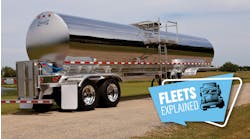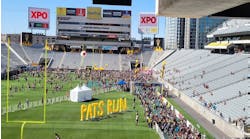Record high claims expenses and restructuring costs pushed U.S. Xpress Enterprises' third-quarter results into the red, and President and CEO Eric Fuller told analysts not to expect “some heroic improvement” in the company’s numbers as his team looks to boost utilization.
U.S. Xpress posted a net loss of nearly $20 million in the three months ended Sept. 30 on revenues of $548 million. A year ago, the company lost $5.5 million on $491 million in sales. The biggest drag on third-quarter earnings was $25.7 million in claims costs—mostly from two accidents that happened in prior years—and $4.4 million in expenses related to a broad restructuring plan Fuller and CFO Eric Peterson outlined two months ago. Chattanooga, Tennessee-based U.S. Xpress is No. 18 on the FleetOwner 500: Top For-Hire Fleets of 2022.
On a conference call, Peterson said claims costs also climbed because cases backlogged during the depths of the COVID-19 pandemic are starting to clear. During Q3, he said, U.S. Xpress’ total claims costs were $43.9 million compared to the $23.1 million average from the previous eight quarters. That’s an increase even larger than he forecast in September.
See also: U.S. Xpress sales chief to depart in cost-cutting move
When first presented, the company’s restructuring plan—which abandoned high-profile tech-heavy investments in its Variant brand—sought to save it about $25 million in costs annually. Since then, executives have identified another $3 million in spending it will eliminate as it looks “to get back to the basics of trucking.” The cuts, of which $22 million are coming from laying off workers, will begin to show up in the company’s financials for the fourth quarter.
Further progress on Fuller’s getting-back-to-basics mission will take longer, however. U.S. Xpress, he said, needs to increase the utilization of its over-the-road fleet to meaningfully improve its results—fleet growth is off the table for now—but that will be a slog in a slowing freight market.
“Growing your utility in a market like this is difficult,” he told analysts. “I think we are very cognizant of that. I would expect slow incremental sequential growth—an improvement—but I don’t expect some heroic improvement.”
Later during his conversation with analysts, Fuller said “it’s super important” for U.S. Xpress to focus on growing its profit margins—its truckload adjusted operating ratio for Q3 was 106.3%, although that included about 7.5 points from the claims and restructuring costs—adding that this his team won’t deviate from that strategy “even if the market returns.”
Shares of U.S. Xpress (Ticker: USX) fell nearly 2% Nov. 4 after the company’s Q3 report. Midday Nov. 7, they were changing hands at $2.22, down slightly on the day. Over the past six months, they have lost about 15% of their value, trimming U.S. Xpress’ market capitalization to about $115 million.




